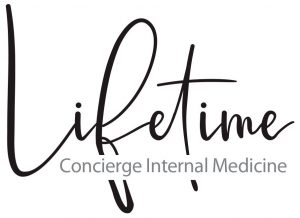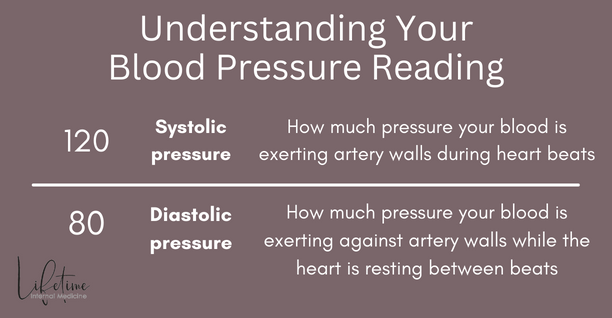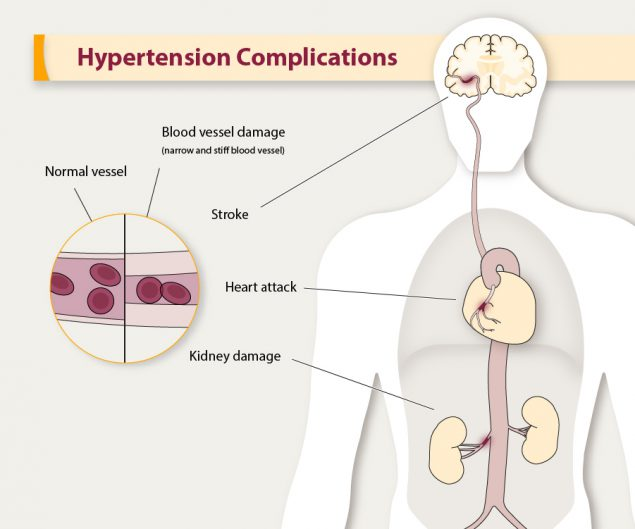What exactly is high blood pressure or hypertension (HTN)?
High blood pressure occurs when the force of the blood flowing through your vessels is consistently too high. Did you know that nearly half of the American population has HTN, and most don’t even know it! Since HTN often has no symptoms, it is often referred to as the “silent killer.”
Over time untreated HTN can lead to a variety of health problems including stroke, heart attack, heart failure, kidney disease or failure, vision loss, sexual dysfunction, and peripheral artery disease. The best way to know if you have HTN is to get your blood pressure checked. Often a diagnosis of HTN is made after consistently elevated readings over days to weeks.
The top number is known as systolic pressure, and it indicates how much pressure your blood is exerting artery walls during heart beats. The bottom number is known as diastolic pressure, and it indicates how much pressure your blood is exerting against artery walls while the heart is resting between beats. Your blood pressure is measured in millimeters of mercury (mm Hg).
In 2017, The American College of Cardiology revised guidelines. Readings of less than 120/80 mm Hg are considered within the normal range. The new set of guidelines increases HTN awareness, encourages lifestyle modifications, and if necessary, medication initiation.
Blood pressure targets should be applied in the appropriate clinical context and on a patient-by-patient basis. In clinical practice, one size does not always fit all, as special cases exist. Below is a chart from the American Heart Association showing the current guidelines for blood Pressure.
Risk Factors for HTN
Most people with HTN have what we call essential or primary HTN. This means that there is not another underlying medial cause for the HTN (such as kidney disease, endocrine tumors, medication side effects, sleep apnea etc.). There are a variety of factors that can contribute to essential HTN:
- Hereditary factors: Strong family history of HTN may increase your risk of developing HTN.
- Age: As we age our blood vessels tend to become stiffer. The older you are the more you are at risk for HTN.
- Race: African Americans tend to develop HTN more often than any other racial background in the United States, in addition their blood pressure also tends to be more resistant to medication.
- Sedentary lifestyle: Not getting the recommended 150 minutes a week of exercise can increase your risk of HTN.
- Unhealthy diet: A diet pattern that is too high in salt, fat, and calories is linked to developing HTN.
- Overweight or obese: Excess weight contributes to HTN. Loosing as little as 10 lbs can reduce your blood pressure. Research shows that every kilogram lost (2.2 lbs) equates to a 1 point drop in both systolic and diastolic pressure.
- Lack of sleep: Not getting the appropriate amount or quality of sleep can impact your blood pressure.
- Smoking: Using tobacco can cause your blood pressure to temporarily increase and can contribute to arterial damage over time.
- Excess Stress: Too much stress can contribute too poor health habits leading to HTN
- Excess alcohol: Having more than three drinks on one sitting temporarily raises blood pressure and repeated heavy drinking or binge drinking can lead to elevated pressure.
What Can Be Done to Treat Hypertension?
In general, treatment for HTN includes lifestyle changes medication if necessary. Lifestyle changes include consuming a hearth healthy diet (such as DASH), reducing sodium intake, increasing physical activity, limiting alcohol consumption, and losing weight if you are overweight or obese.
When it comes to medication management of HTN, there are many drug families that can be utilized. For example, diuretics such as hydrochlorothiazide work by reducing excess sodium and water in the body. Angiotensin converting enzyme (ACE) Inhibitors such as Lisinopril work by helping the body produce less angiotensin which in turn helps blood vessels relax lowering blood.
Hypertension is a chronic, but treatable condition. If you are diagnosed with HTN, it is important to keep up with your healthcare provider for regular checkups to monitor your condition. Between lifestyle modifications and medications, most people can keep their blood pressure in a pressure healthy range and avoid some of the more severe complications associated with HTN.
Stay tuned for our next blog that will focus on a common concern regarding sporadic or occasional elevations in blood pressure.



